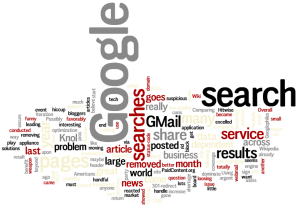Searching for Distance Education? A librarian can help
 By: Philip Price, MA Educational Technology, MA Library Science
By: Philip Price, MA Educational Technology, MA Library Science
The ability to find, evaluate and use information, to retrieve something that addresses an informational need, sounds deceptively easy. One simply ‘googles’ a term and is presented with. … 1,526,766 ‘relevant’ items to look at. Or you access Wikipedia and the combined knowledge, or bias, of anyone and everyone who has access to a computer, is may be scanned for data relating to the question. Searching for Distance Education is often the sum of the above actions. Searching within a course may follow the same pattern. However there are other options.
Librarians support the teaching of thinking skills by demonstrating and encouraging a collaboration of resource options, basic theories of search, combined with structured strategies for fine-tuning a path of learning. |
Information retrieval systems are as varied as the materials found in a library. From sadly under-rated books, with tables of contents, indexes, chapter heading and page numbers to the most sophisticated search engine or information aggregate, each set of technologies represents a systems for a retrieval of information. These systems do not work autonomously nor are they as intuitive as we would like to think. The system most often referenced at an aerospace company where I last worked was called, “Go ask Frank down the hall.” Inherent in this simple direction was trust in a validated resource, the reliability of past occasion, ease of access and use, precision based on experience as well as in-depth knowledge, and maximum amount of flexibly should the query become more complex. Should Frank be on vacation however, the transaction would grind to a halt. A librarian’s goal, similar to that of an effective distance educator, should be to create paths of inquiry and research that a user can pursue even if Frank is ‘out of office’.
Accessibility, portability, convenience and personalization seem to be the touchstones of a new generation of  information seekers. Swanbrow (2004) observes that, “Millennials may not know how to get there but they do seem to know where they eventually want to end up.” Although Swanbrow seems to be referring to career choices and lifestyle arrangements we can easily look at a new generation of information seekers with the same motivation; wanting answers immediately, quick scanning for relevance and application, making snap judgments on validity and authority, with an attitude that fast, easy, where convenient means ‘best’. Increased document and subject complexity, increased storage and processing capabilities, as well as evolving user awareness and demand are part of the continuing wave of change affecting how we keep and retrieve information. Our systems and strategies for providing information must take all this in stride while guiding best practices for research, investigation, evaluation, and application.
information seekers. Swanbrow (2004) observes that, “Millennials may not know how to get there but they do seem to know where they eventually want to end up.” Although Swanbrow seems to be referring to career choices and lifestyle arrangements we can easily look at a new generation of information seekers with the same motivation; wanting answers immediately, quick scanning for relevance and application, making snap judgments on validity and authority, with an attitude that fast, easy, where convenient means ‘best’. Increased document and subject complexity, increased storage and processing capabilities, as well as evolving user awareness and demand are part of the continuing wave of change affecting how we keep and retrieve information. Our systems and strategies for providing information must take all this in stride while guiding best practices for research, investigation, evaluation, and application.
Librarians support the teaching of thinking skills by demonstrating and encouraging a collaboration of resource options, basic theories of search, combined with structured strategies for fine-tuning a path of learning. They sit at the juncture of design, organization, and retrieval of information, and, act as guides for evaluation and validation, in an effort to provide the best possible a solution to the query of the information seeker. Retrieval is a skill that permeates all aspects of our careers and functions. Librarians have the skills and abilities to design, query and evaluate a variety of systems to locate information that pertains to the question presented. They know how to access and manipulate, systems of inquiry and retrieval, either web-based, via a handout, or even during a face-to-face interview, that attempt to make sense of an “anomalous state of knowledge” to use Belkin’s (1980) term, and help the user ‘formalize’ his or her query. And that is only the first step. Familiarization with what is available, ability to easily access and evaluate returned results while offering additional resources for further inquiry are part and parcel of our jobs.
Each moment of interaction with a user, a technology or systems of information is an opportunity to understand, refocus, and refine searching tasks and strategies to find relevant information. These opportunities also allow us to examine the design and description efforts that prepare the materials for eventual use. To prepare for this we must first understand the query its component elements and the capabilities of the systems we are using, know what is available that addresses the area of specificity, be able to use the technologies and systems we are presented with, be capable to evaluate what we find, and look for manner of presentation that answers the query but also anticipates further investigation. No small task.
Salim, et al. (2004) in Perspectives And Alternatives in Searching Strategies discuss how relevance of information is closely aligned to a linguistic aspect of the search and results – how understanding the terms and rules of transactions, how something is sought and indexed, makes locating it easier. They also describe how improvements in the hardware, software and facilities of our systems mostly reflect the mechanical and technical aspects and do not address the intellectual aspect of search strategies. Information professionals, particularly those who maintain a teaching function as part of their repertoire need to consider what they are teaching, ensuring that along with the rapidly changing vocabulary and content, they are also teaching a set of grammar rules that govern good description and good searching.
Librarians are tasked with teaching concepts of critical thinking, evaluative analysis, and a grammar of information retrieval and interpretation in order to enhance the capabilities of consumers of information (and creators as well). Listening, thinking and sharing ideas sensitizes each one of us to alternatives for current realities, and provides us with the tools for creating paths of inquiry, and grammars with which to perform our tasks. We learn and communicate so our customers benefit. We can teach our customers to critically evaluate any reference they are using. As we all learn to use new tools to search out information, and evaluate its significance we will need to incorporate good searching practices regardless of the interface.
References
Belkin, N.J. (1980). Anomalous states of knowledge as a basis for information retrieval Canadian Journal of Information Science 5, 133-143.
Belkin, N.J. & Cool, C. (1993). The concept of information seeking strategies and its use in the design of information retrieval systems. Paper presented at the AAAI Spring Symposium on Case-Based Reasoning and Information Retrieval, Stanford, CA, March 1993.
Salim, J., & Ding, M. C. (2004). Information skills: Perspectives and alternatives in search strategies. Malaysian Journal of Library & Information Science v. 9 no. 2 (December) p. 79-94
Swanbrow, D. (2004). The millenials. LSAmagazine, Spring 2004. University of Michigan
Philip K. Price has been involved with information design and dissemination of some kind for over 30 years – ESL teacher, language liaison, curriculum developer, workshop facilitator, media specialist, methodologist, school administrator, university faculty advisor, information systems developer and coordinator, web specialist – titles are so inexact. He has identified, molded and moved information for the business sector, as well as within military and educational environments.
His training and education programs have ranged from language and technical disciplines, to project innovation and management, budget and community relations, to basic teacher training. He has worked in Iran, Saudi Arabia, Indonesia, Oman and San Diego.
As Senior Instructional Designer and Developer at Sultan Qaboos University in the Sultanate of Oman, he assisted in the organizational development of the Centre for Educational Technology, advised faculty on performance and technology issues, oversaw media production, designed/implemented seminars and workshops for the university, and counseled students interested in instructional design and educational technology.
While working for Goodrich Aerospace in San Diego he led the development of manufacturing information systems for the corporate intranet, was certified as a developer and auditor for a company-wide ISO 14001 EHS Management Systems implementation and education, demonstrated the application of Lean Manufacturing Principles in non-manufacturing areas, and coordinated and evaluated technical training while looking for a place to retire.
On the way to retirement he decided to get a degree in Information and Library Science to become a librarian, which seemed to combine all prior experience and practice. Three years at a public library taught him the value of listening, clear directions and follow-through. It also exposed the multi-dimensional need for building and supporting the structures, organizations and management that will ensure that we assert our roles as advocates of knowledge growth and sharing. That job will never finish.
Science fiction, travel, the mountains and gardening while learning about languages, culture and people will forever fascinate. Working towards a systematic universal flow of information is a goal that humbles and satisfies his needs and keeps him involved and participating. He earned his B.A. in Spanish and Comparative Linguistics from the University of Michigan, 1975; his M.A. in Education, Instructional Design from San Diego State University, 1985; and his M.L.I.S. Academic, Special Libraries from San Jose State University, 2008.







